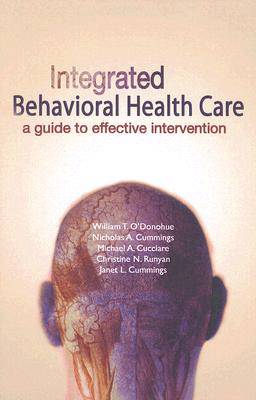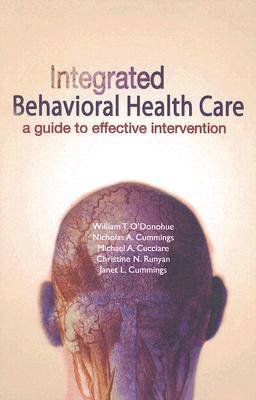
Vous voulez être sûr que vos cadeaux seront sous le sapin de Noël à temps? Nos magasins vous accueillent à bras ouverts. La plupart de nos magasins sont ouverts également les dimanches, vous pouvez vérifier les heures d'ouvertures sur notre site.
- Retrait gratuit dans votre magasin Club
- 7.000.000 titres dans notre catalogue
- Payer en toute sécurité
- Toujours un magasin près de chez vous
Vous voulez être sûr que vos cadeaux seront sous le sapin de Noël à temps? Nos magasins vous accueillent à bras ouverts. La plupart de nos magasins sont ouverts également les dimanches, vous pouvez vérifier les heures d'ouvertures sur notre site.
- Retrait gratuit dans votre magasin Club
- 7.000.0000 titres dans notre catalogue
- Payer en toute sécurité
- Toujours un magasin près de chez vous
Integrated Behavioral Health Care
A Guide to Effective Intervention
Nicholas A Cummings, Michael A Cucciare
Livre relié | Anglais
48,95 €
+ 97 points
Description
Integrated behavioral health care is a health-care service delivery system in which behavioral health care is coordinated with primary medical care. Unlike older approaches to patient care in which mental health professionals worked separately from medical professionals, integrated care recognizes that many patients present to medical professionals with behavioral problems. For example, diabetics or persons suffering from chronic pain may experience depression. Thus patients often need some combination of both behavioral and medical treatment. Integrated care attempts to overcome the traditional division of care so that a coordinated, multidisciplinary approach is taken to provide more appropriate care for patients. In this comprehensive, step-by-step guide, a team of national experts in integrated behavioral health care discusses the economic, clinical, administrative, and procedural issues involved in designing, implementing, and maintaining a successful integrated care delivery system. Among the specific topics discussed are psychopharmacology; the Biodyne model (focused, intermittent psychotherapy throughout the life cycle); guidelines for the treatment of major depression, panic disorder, substance abuse, and attention-deficit/hyperactivity disorder; disease management groups; treatment adherence; patient access to behavioral health care through the primary care provider; and treating special problems related to the elderly and women's health care. This clearly written, well-organized, and thoroughly researched guidebook will be of great interest to researchers and practitioners in psychology, medicine, nursing, social work, psychiatry, and education.
Spécifications
Parties prenantes
- Auteur(s) :
- Editeur:
Contenu
- Nombre de pages :
- 482
- Langue:
- Anglais
Caractéristiques
- EAN:
- 9781591023258
- Date de parution :
- 01-06-06
- Format:
- Livre relié
- Format numérique:
- Ongenaaid / garenloos gebonden
- Dimensions :
- 152 mm x 215 mm
- Poids :
- 635 g







